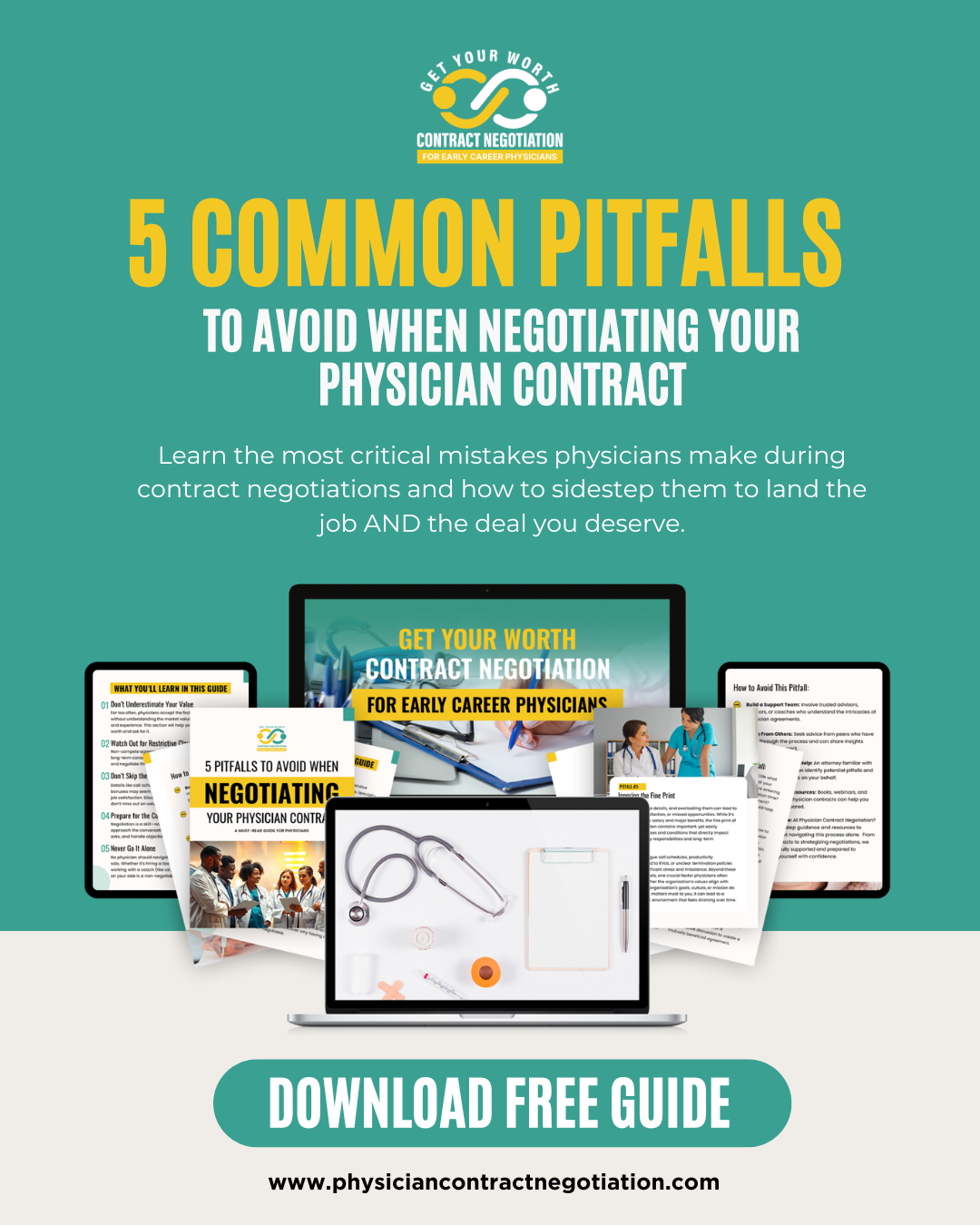Before You Sign: What Your Contract Really Says About Your Life
Jun 16, 2025
Most physicians remember exactly where they were when they got their first “real” job offer.
You’re finally done with endless training and board exams. The recruiter calls or emails you a shiny PDF with your name on it. You see the salary and it’s more money than you’ve ever earned. Relief floods your body: This is it. I did it. It’s finally happening.
You feel excitement, maybe even a sense of validation. However, under that relief, there’s often a quiet thought: Should I read this line by line? I really don’t want to. I don’t even know what this means. Should I push back and negotiate? Will I look ungrateful if I do? I have so many questions to ask, but I don’t want to seem like I don’t want the job.
If you’re like most doctors, no one ever taught you how to read that contract let alone negotiate it. We know, because we’ve been there too. And because we’ve coached countless physicians who, years later, discovered that the biggest sources of frustration in their jobs were written into their contracts all along.
The Part No One Teaches You
Here’s something every early-career physician should know and we wish we’d learned it sooner ourselves:
Your contract is about so much more than your paycheck. It’s a blueprint for how your time, energy, and well-being are treated at work, day in and day out.

Your contract quietly answers questions like:
- Will you get home in time for dinner with your family?
- How many weekends and holidays you’ll trade for extra shifts.
- What happens if you get sick, need family leave, or want to attend a child’s school event.
- How many patients you’ll be expected to see in a day, and how realistic that is.
Most physicians focus only on the salary on page one, and never look at the call schedule, the vague “productivity incentives,” the non-compete clause buried near the end, or the wording that determines how and when they can leave the job if things change.
These hidden lines are the difference between a job that fits your life — and one that swallows it whole.
A Mindset Shift to Protect Yourself
One of the biggest traps for physicians is believing that a contract is a rigid take-it-or-leave-it order. It’s not. A contract is a mutual agreement. It should protect you just as much as it protects your employer.

Too many doctors sign a contract thinking, They’re offering me this opportunity; I should just be grateful. But gratitude is not a substitute for boundaries.
A strong contract does three things:
✅ It honors the years you invested becoming the physician you are.
✅ It spells out what’s expected of you and what’s not.
✅ It makes sure your job doesn’t bleed endlessly into your personal time, your family life, and your mental health.
In other words: it gives you the structure to keep loving what you do.
Why We’re Here
We created Doctor Contract Negotiation LLC because we’re tired of watching talented, caring doctors burn out in jobs they could have shaped differently if only they’d known what to ask for.

We know the medical culture that makes you feel like you should be able to handle it all. We know how intimidating it feels to question a contract when you’re eager to start your dream job. We also know how freeing it is when you see your worth clearly on paper and can advocate for it with calm confidence.
You deserve a contract that sees you as more than just a provider. You are a whole human being, with a family, a life outside of work, and dreams that extend far beyond the hospital walls. We’re here to help you protect that.
If You Have an Offer in Hand
Take a deep breath — and remind yourself that you don’t have to rush this decision.

You’ve invested years of sacrifice, late nights, and impossible choices to become the physician you are today. That deserves more than a quick signature and silent hope that it’ll all work out.
Here’s what we want you to do:
✅ Block time to read EVERY WORD.
Don’t skim. Set aside an hour to read your contract from beginning to end. Highlight anything you don’t fully understand.
✅ Pay special attention to the parts no one talks about.
Look closely at the call schedule, expectations for nights and weekends, vague phrases like “as needed” or “reasonable,” and any non-compete clauses that could limit your options later.
✅ Write down your questions.
No question is too small or too obvious. Good employers expect you to clarify details. It shows you’re serious and professional.
✅ Ask for time to review.
If you feel rushed, say: “I’d like a few days to review this in detail and follow up with my questions.” Any fair employer will respect this.
✅ Get a second set of eyes.
Don’t do this alone. A trusted mentor, an experienced physician coach, or a contract lawyer familiar with physician agreements can catch red flags you might miss.
✅ Remember: Negotiation is normal.
Most offers are built with wiggle room for adjustments. Asking for clarity or fair changes doesn’t make you greedy - it makes you smart.
A strong contract means you can do what you love without losing yourself in the process. It means you have energy for your family, your patients, and your own well-being.
You’ve worked too hard to leave this to chance. Give yourself permission to pause, ask for what you need, and sign only when you know your job will support the life you want to live — not drain it.




